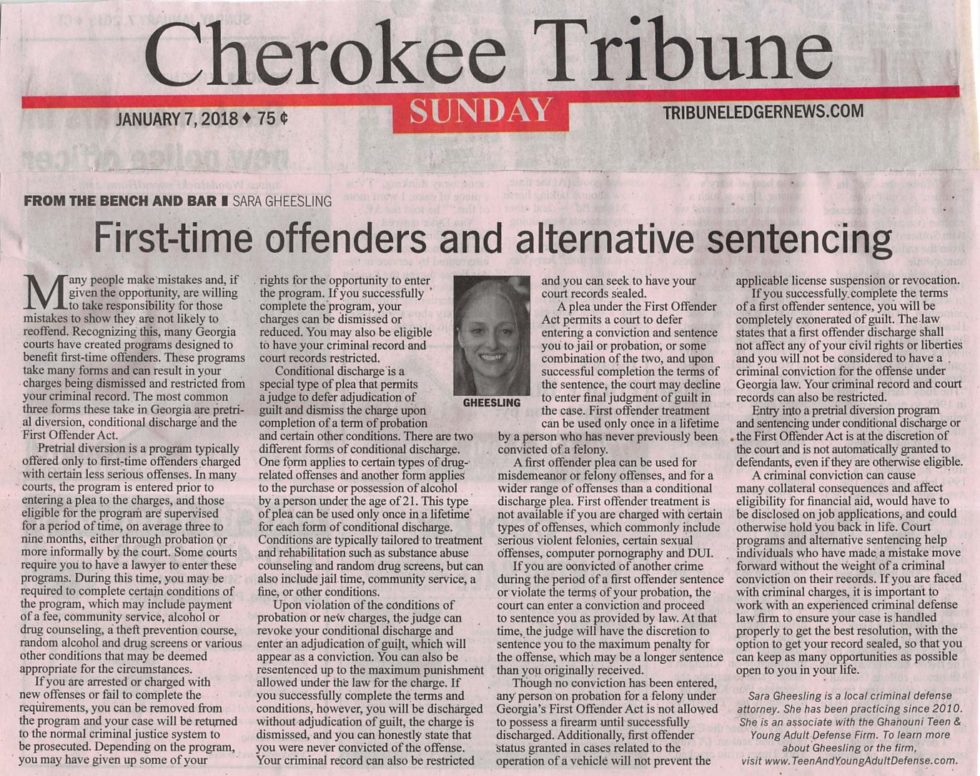
Many people make mistakes and, if given the opportunity, are willing to take responsibility for those mistakes to show they are not likely to reoffend. Recognizing this, many Georgia courts have created programs designed to benefit first time offenders. These programs take many forms and can result in your charges being dismissed and restricted from your criminal record. The most common three forms these take in Georgia are pretrial diversion, conditional discharge, and the First Offender Act, all of which are the focus of this article.
Pretrial diversion is a program typically only offered to first time offenders charged with certain less serious offenses. In many courts, the program is entered prior to entering a plea to the charges, and those eligible for the program are supervised for a period of time, on average three to nine months, either through probation or more informally by the court. Some courts require you to have a lawyer to enter these programs. During this time, you may be required to complete certain conditions of the program which may include payment of a fee, community service, alcohol or drug counseling, a theft prevention course, random alcohol and drug screens, or various other conditions that may be deemed appropriate for the circumstances.
If you are arrested or charged with new offenses or fail to complete the requirements, you can be removed from the program and your case will be returned to the normal criminal justice system to be prosecuted. Depending on the program, you may have given up some of your rights for the opportunity to enter the program. If you successfully complete the program, your charges can be dismissed or reduced. You may also be eligible to have your criminal record and court records restricted.
Conditional discharge is a special type of plea that permits a judge to defer adjudication of guilt and dismiss the charge upon completion of a term of probation and certain other conditions. There are two different forms of conditional discharge. One form applies to certain types of drug-related offenses and another form applies to the purchase or possession of alcohol by a person under the age of 21. This type of plea can only be used once in a lifetime for each form of conditional discharge. Conditions are typically tailored to treatment and rehabilitation such as substance abuse counseling and random drug screens, but can also include jail time, community service, a fine, or other conditions.
Upon violation of the conditions of probation or new charges, the judge can revoke your conditional discharge and enter an adjudication of guilt, which will appear as a conviction. You can also be resentenced up to the maximum punishment allowed under the law for the charge. If you successfully complete the terms and conditions, however, you will be discharged without adjudication of guilt, the charge is dismissed, and you can honestly state that you were never convicted of the offense. Your criminal record can also be restricted and you can seek to have your court records sealed.
A plea under the First Offender Act permits a court to defer entering a conviction and sentence you to jail or probation, or some combination of the two, and upon successful completion the terms of the sentence, the court may decline to enter final judgment of guilt in the case. First offender treatment can only be used once in a lifetime by a person who has never previously been convicted of a felony.
A first offender plea can be used for misdemeanor or felony offenses, and for a wider range of offenses than a conditional discharge plea. First offender treatment is not available if you are charged with certain types of offenses, which commonly include serious violent felonies, certain sexual offenses, computer pornography, and DUI.
If you are convicted of another crime during the period of a first offender sentence or violate the terms of your probation, the court can enter a conviction and proceed to sentence you as provided by law. At that time, the judge will have the discretion to sentence you to the maximum penalty for the offense, which may be a longer sentence than you originally received.
Though no conviction has been entered, any person on probation for a felony under Georgia’s First Offender Act is not allowed to possess a firearm until successfully discharged. Additionally, first offender status granted in cases related to the operation of a vehicle will not prevent the applicable license suspension or revocation.
If you successfully complete the terms of a first offender sentence, you will be completely exonerated of guilt. The law states that a first offender discharge shall not affect any of your civil rights or liberties and you will not be considered to have a criminal conviction for the offense under Georgia law. Your criminal record and court records can also be restricted.
Entry into a pretrial diversion program and sentencing under conditional discharge or the First Offender Act is at the discretion of the court and is not automatically granted to defendants, even if they are otherwise eligible.
A criminal conviction can cause many collateral consequences and affect eligibility for financial aid, would have to be disclosed on job applications, and could otherwise hold you back in life. Court programs and alternative sentencing help individuals who have made a mistake move forward without the weight of a criminal conviction on their records. If you are faced with criminal charges, it is important to work with an experienced criminal defense law firm to ensure your case is handled properly to get the best resolution, with the option to get your record sealed, so that you can keep as many opportunities as possible open to you in your life.
Ghanouni Teen & Young Adult Defense Firm